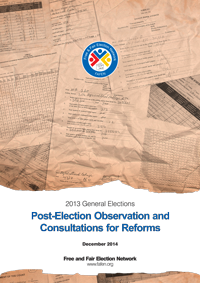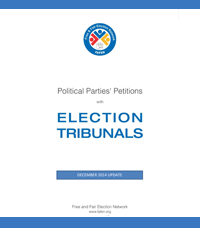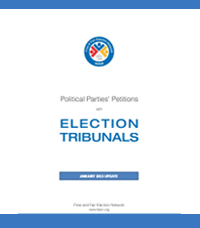Free and Fair Election Network’s (FAFEN’s) election observation was divided in three logical phases; pre-election, Election Day and post-election. This report is based on post-election observation conducted by FAFEN observers in 124 districts across the country. Lehri and Sohbatpur in Balochistan and Korangi in Sindh were not treated as separate districts in this report as they were granted the status of district after 2013 General Elections while National Assembly constituencies in Muzaffargarh, Kohlu and Khyber Agency were not observed. The observation started in June 2013 and continued till the end of July, focusing primarily on election-related complaints, returned candidates’ election expenses along with collection of Election Day forms from the offices of Returning Officer, District Returning Officer and District Election Commissioner. FAFEN observers also collected information regarding electoral and political violence from the office of District Police Officers.
Section 45 of the Representation of the People Act 1976 states that all documents retained by the ECP except the ballot papers shall be made available for public inspection upon an application made by any citizen following the formal procedures. Using this right, Free and Fair Election Network requested the concerned authorities to make the abovementioned documents available so that election transparency and authenticity can be ensured after scrutiny of the official documents. FAFEN observers obtained 39,690 Form XIVs (Statement of the Count) from 160 constituencies and 27,781 Form XVs (Ballot Paper Account Form) from 127 constituencies across the country. These forms were then scrutinized on constituency basis and formed the foundation for FAFEN’s detailed report on election audit, which will be separately published. FAFEN observers also managed to obtain 155 Form XVIs (Consolidation of Statements of the Count), 162 Form XVIIs (Result of the Count) and 137 polling schemes from across Pakistan.
Information related to winning candidates’ campaign expenses from 159 constituencies during the post-election period was also collected as a part of post-election observation. These included 83 constituencies of Punjab, 31 of Sindh, 27 of Khyber Pakhtunkhwa, nine of Balochistan, seven of FATA and both constituencies of ICT. No information could be collected from 113 constituencies. The findings from these documents helped FAFEN come up with recommendations to improve check and balance on electoral finances.
ECP claims to have established an effective complaint handling mechanism in most, if not all, constituencies of Pakistan. FAFEN collected information related to election complaints from offices of concerned officers to analyze the effectiveness of these mechanisms in practicality. The data shows that as many as 1,317 complaints were filed with ECP of which 1,023 were resolved. To evaluate the law and order situation during the election period, FAFEN collected information regarding reported incidents of illegitimate campaign-related activities from District Police Officers. The data suggested that 49 FIRs were filed in as many as 86 districts regarding unlawful campaigning activities during this period.
Following the election exercise, FAFEN started consultative sessions with different stakeholders across the country in order to gather suggestions and recommendations related to the electoral reforms that are deemed necessary by the stakeholders. In this regard, partner organizations working as a part of the network organized 304 meetings in which more than 6,000 stakeholders participated. During these meetings 5,510 recommendations related to different themes were recorded. After rigorous research and scrutiny of election practices and laws, FAFEN published its recommendations for electoral reforms, which are reflective of the observations and suggestions form consultative sessions.
To download complete report, click here




